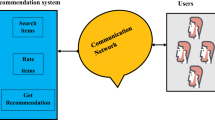Abstract
The digital revolution of the banking system with evolving European regulations have pushed the major banking actors to innovate by a newly use of their clients’ digital information. Given highly sparse client activities, we propose CPOPT-Net, an algorithm that combines the CP canonical tensor decomposition, a multidimensional matrix decomposition that factorizes a tensor as the sum of rank-one tensors, and neural networks. CPOPT-Net removes efficiently sparse information with a gradient-based resolution while relying on neural networks for time series predictions. Our experiments show that CPOPT-Net is capable to perform accurate predictions of the clients’ actions in the context of personalized recommendation. CPOPT-Net is the first algorithm to use non-linear conjugate gradient tensor resolution with neural networks to propose predictions of financial activities on a public data set.
Access this chapter
Tax calculation will be finalised at checkout
Purchases are for personal use only
Similar content being viewed by others
Notes
- 1.
The data set is available at https://www.kaggle.com/c/santander-product-recommendation.
- 2.
The code is available at https://github.com/dagrate/cpoptnet.
References
Brand, M.: Fast online svd revisions for lightweight recommender systems. In: Proceedings of the 2003 SIAM International Conference on Data Mining, pp. 37–46. SIAM (2003)
Ghazanfar, M.A., Prugel, A.: The advantage of careful imputation sources insparse data-environment of recommender systems: generating improved svd-basedrecommendations. Informatica 37(1) (2013)
kumar Bokde, D., Girase, S., Mukhopadhyay, D.: Role of matrix factorization model in collaborative filtering algorithm: A survey. CoRR, abs/1503.07475 (2015)
Lian, D., Zhang, Z., Ge, Y., Zhang, F., Yuan, N.J., Xie, X.: Regularized content-aware tensor factorization meets temporal-aware location recommendation. In: 2016 IEEE 16th International Conference on Data Mining (ICDM), pp. 1029–1034. IEEE (2016)
Zhao, S., Lyu, M.R., King, I.: Aggregated temporal tensor factorization model for point-of-interest recommendation. In: Hirose, A., Ozawa, S., Doya, K., Ikeda, K., Lee, M., Liu, D. (eds.) ICONIP 2016. LNCS, vol. 9949, pp. 450–458. Springer, Cham (2016). https://doi.org/10.1007/978-3-319-46675-0_49
Song, T., Peng, Z., Wang, S., Fu, W., Hong, X., Yu, P.S.: Review-based cross-domain recommendation through joint tensor factorization. In: Candan, S., Chen, L., Pedersen, T.B., Chang, L., Hua, W. (eds.) DASFAA 2017. LNCS, vol. 10177, pp. 525–540. Springer, Cham (2017). https://doi.org/10.1007/978-3-319-55753-3_33
Kolda, T.G., Bader, B.W.: Tensor decompositions and applications. SIAM Rev. 51(3), 455–500 (2009)
Acar, E., Kolda, T.G., Dunlavy, D.M.: All-at-once optimization for coupled matrix and tensor factorizations. arXiv preprint arXiv:1105.3422 (2011)
Harshman, R.A.: Foundations of the parafac procedure: Models and conditions for an explanatory multimodal factor analysis (1970)
Carroll, J.D., Chang, J.J.: Analysis of individual differences in multidimensional scaling via an n-way generalization of decomposition. Psychometrika 35(3), 283–319 (1970)
Welling, M., Weber, M.: Positive tensor factorization. Pattern Recogn. Lett. 22(12), 1255–1261 (2001)
Ge, H., Caverlee, J., Lu, H.: Taper: a contextual tensor-based approach for personalized expert recommendation. In: Proceedings of the 10th ACM Conference on Recommender Systems, pp. 261–268. ACM (2016)
Almutairi, F.M., Sidiropoulos, N.D., Karypis, G.: Context-aware recommendation-based learning analytics using tensor and coupled matrix factorization. IEEE J. Sel. Top. Sig. Process. 11(5), 729–741 (2017)
Cai, G., Gu, W.: Heterogeneous context-aware recommendation algorithm with semi-supervised tensor factorization. In: Yin, H., et al. (eds.) IDEAL 2017. LNCS, vol. 10585, pp. 232–241. Springer, Cham (2017). https://doi.org/10.1007/978-3-319-68935-7_26
Acar, E., Dunlavy, D.M., Kolda, T.G.: A scalable optimization approach for fitting canonical tensor decompositions. J. Chemometr. 25(2), 67–86 (2011)
Author information
Authors and Affiliations
Corresponding author
Editor information
Editors and Affiliations
Rights and permissions
Copyright information
© 2019 Springer Nature Switzerland AG
About this paper
Cite this paper
Charlier, J., State, R., Hilger, J. (2019). Predicting Sparse Clients’ Actions with CPOPT-Net in the Banking Environment. In: Meurs, MJ., Rudzicz, F. (eds) Advances in Artificial Intelligence. Canadian AI 2019. Lecture Notes in Computer Science(), vol 11489. Springer, Cham. https://doi.org/10.1007/978-3-030-18305-9_59
Download citation
DOI: https://doi.org/10.1007/978-3-030-18305-9_59
Published:
Publisher Name: Springer, Cham
Print ISBN: 978-3-030-18304-2
Online ISBN: 978-3-030-18305-9
eBook Packages: Computer ScienceComputer Science (R0)




